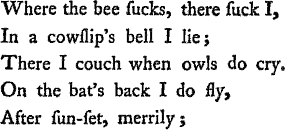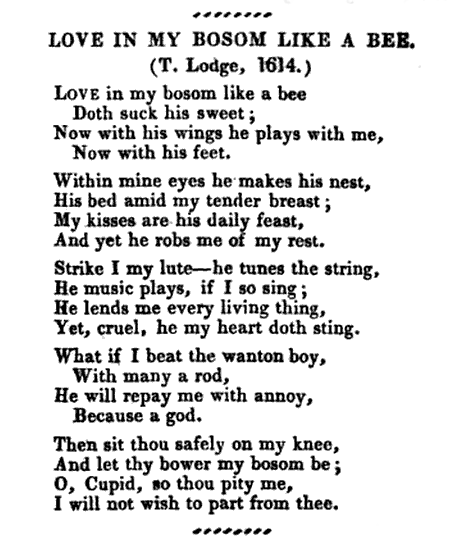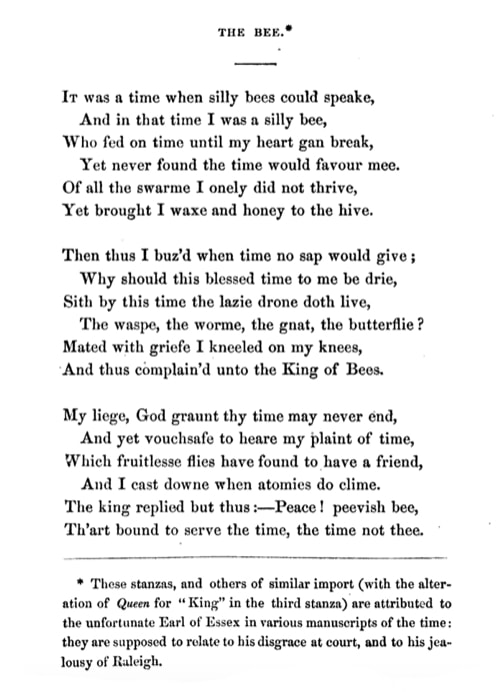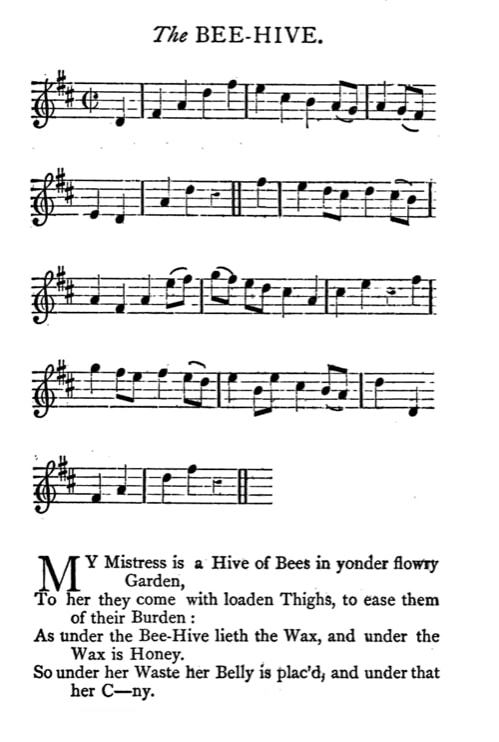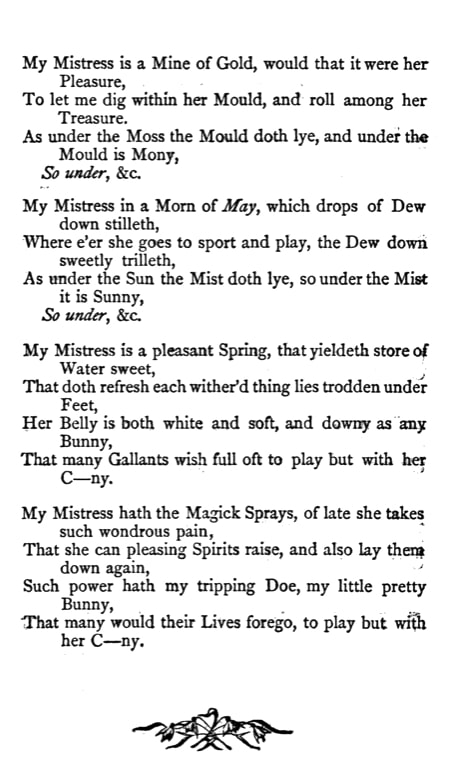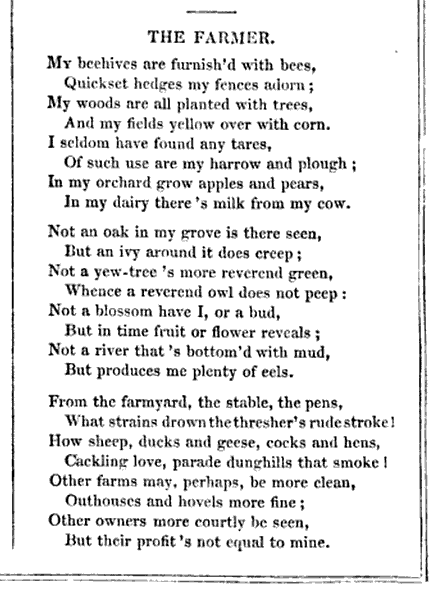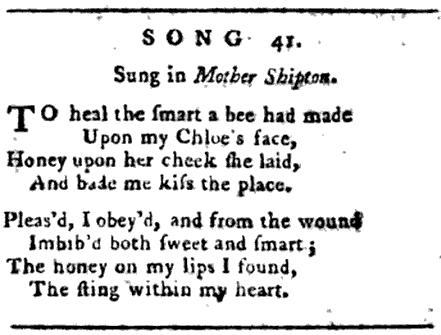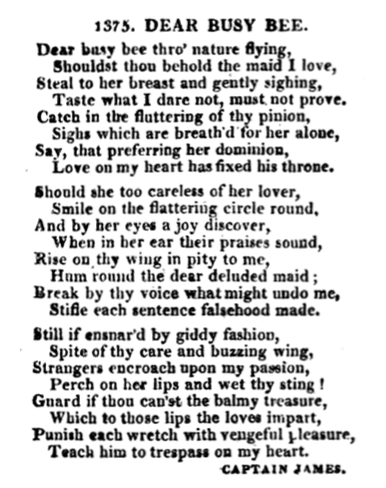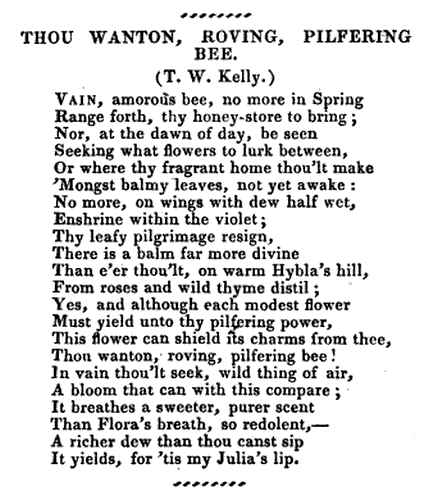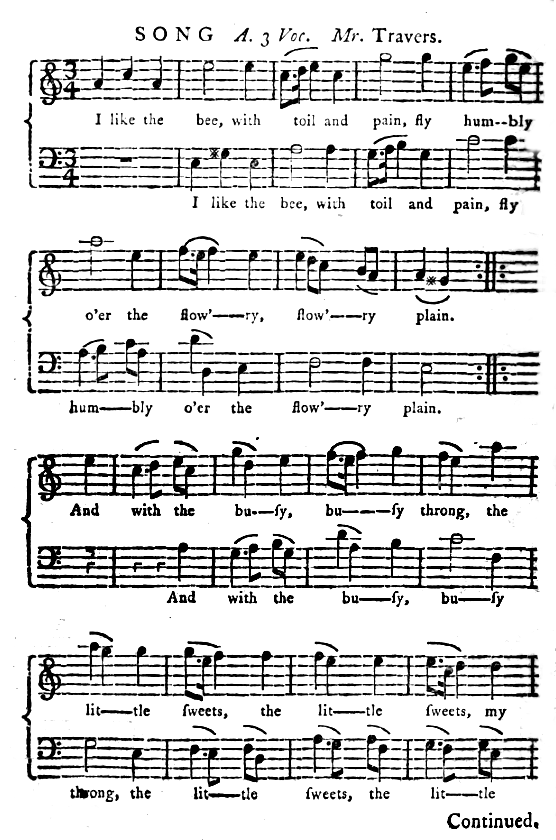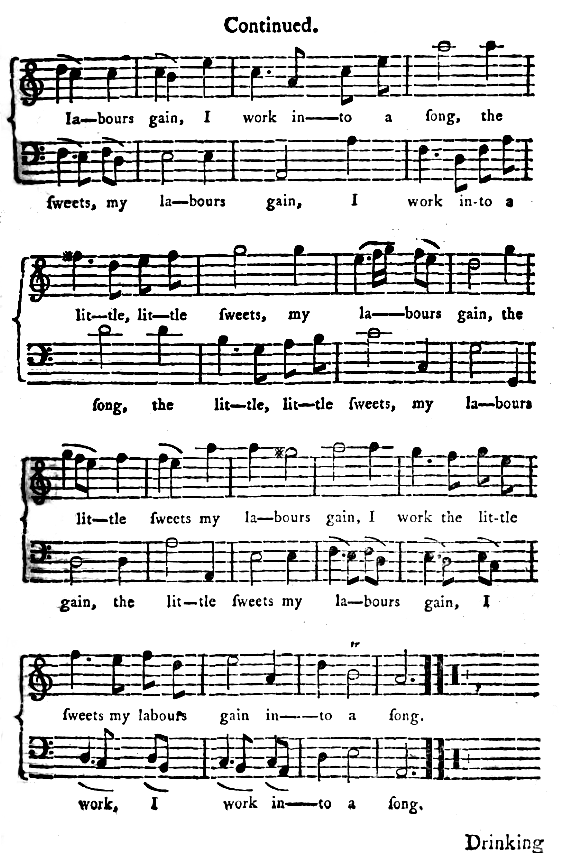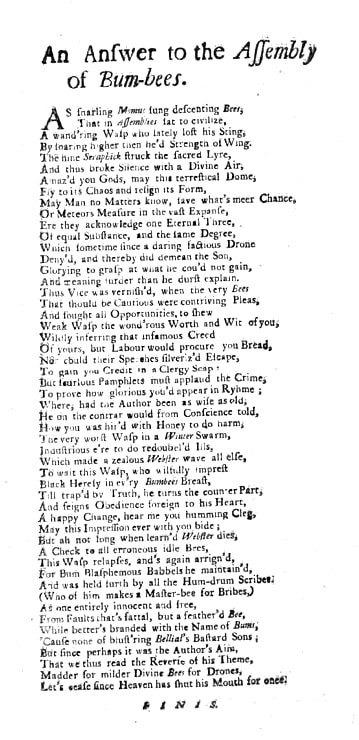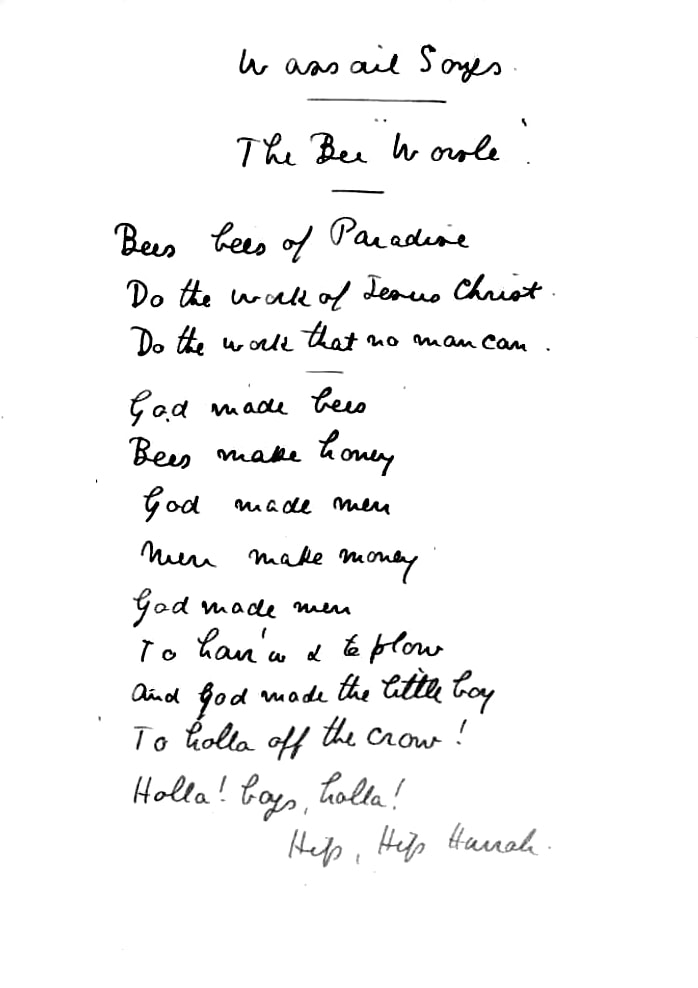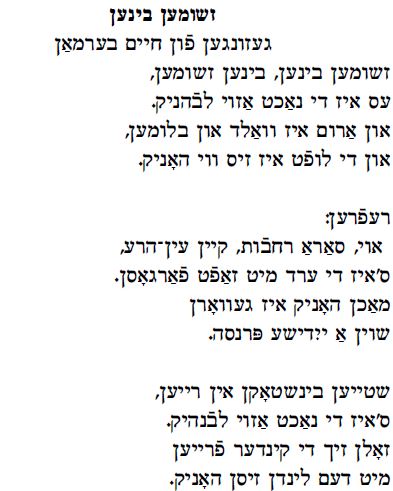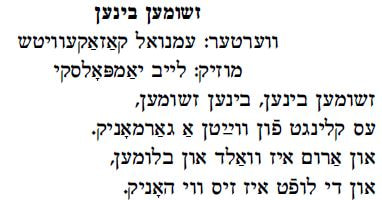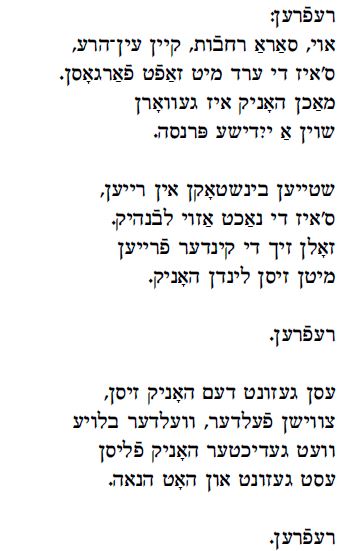|
The Bee-Boy's Song – Rudyard Kipling (1906)
BEES! BEES! Hark to your bees! "Hide from your neighbours as much as you please, But all that has happened, to us you must tell, Or else we will give you no honey to sell!" A maiden in her glory, Upon her wedding-day, Must tell her Bees the story, Or else they'll fly away. Fly away - die away - Dwindle down and leave you! But if you don't deceive your Bees, Your Bees will not deceive you. Marriage, birth or buryin', News across the seas, All you're sad or merry in, You must tell the Bees. Tell 'em coming in an' out, Where the Fanners fan, 'Cause the Bees are just about As curious as a man! Don't you wait where the trees are, When the lightnings play, Nor don't you hate where Bees are, Or else they'll pine away. Pine away - dwine away - Anything to leave you! But if you never grieve your Bees, Your Bees'll never grieve you. |
|
|
Song from The Tempest – William Shakespeare (1610)
Where the bee sucks, there suck I: In a cowslip’s bell I lie; There I couch when owls do cry. On the bat’s back I do fly After sunset merrily. Merrily, merrily shall I live now Under the blossom that hangs on the bough. Love In My Bosom Like A Bee – T. Lodge (1614) Love in my bosom like a bee Doth suck his sweet; Now with his wings he plays with me, Now with his feet. Within mine eyes he makes his nest, His bed amid my tender breast; My kissed are his daily feast, And yet he robs me of my rest. Strike I my lute – he tunes the string, He music plays, if I so sing; He lends me every living thing, Yet, cruel, he my heart doth sting. What if I beat the wanton boy, With many a rod, He will repay me with annoy, Because a god. Then sit thou safely on my knee, And let thy bower my bosom be; O, Cupid, so thou pity me, I will not wish to part from thee. The Bee It was a time when silly bees could speake, And in that time I was a silly bee, Who fed on time until my heart gan break, Yet never found the time would favour mee. Of all the swarm I only did not thrive, Yet brought I wake and honey to the hive. Then thus I buz’d when time no sap would give; Why should this blessed time to me be drie, Sith by this time the lazie drone doth live, The waspe, the worme, the gnat, the butterflie? Mated with griefe I kneeled on my knees, And thus complain’d unto the King of Bees. My liege, God graunt thy time may never end, And yet vouchsafe to heare my plaint of time, Which fruitlesse flies have found to have a friend, And I cast downe when atomies do clime. The king replied but thus :– Peace! peevish bee, Th’art bound to serve the time, the time not thee. The Bee-Hive – 1719 My mistress is a hive of bees In yonder flow’ry garden, To her they come with loaden thighs To ease them of their burden, As under the Bee-Hive lieth the wax And under the wax is honey, So under her waste her belly is plac’d, And under that her cunny. My mistress is a mine of gold Would that it were her pleasure, To let me dig within her mould And roll among her treasure. As under the moss the mould doth lye And under the Mould is Mony So under her waste her belly is plac’d, And under that her cunny. My mistress in a morn of May Which drops of dew down stilleth Where e’er she goes to sport and play The dew down sweetly trilleth As under the Sun the mist doth lye So under the mist it is sunny So under her waste her belly is plac’d, And under that her cunny. My mistress is a pleasant spring That yieldeth store of water sweet That doth refresh each wither’d thing Lies trodden under feet Her belly is both white and soft And downy as any bunny That many gallants wish full oft To play but with her cunny. My mistress hath the magick sprays Of late she takes such wondrous pain That she can pleasing spirits raise And also lay them down again Such power hath my tripping doe My little pretty bunny That many would their lives forego To play but with her cunny. The Farmer – Charles Dibdin (1780s) My beehives are furnish’d with bees, Quickset hedges my fences adorn; My woods are all planted with trees, And my fields yellow over with corn. I seldom have found any tares, Of such use are my harrow and plough; In my orchard grow apples and pears, In my dairy there’s milk from my cow. Not an oak in my grove is there seen, But an ivy around it does creep; Not a yew-trees’s more reverend green, Whence a reverend owl does not peep: Not a blossom have I, or a bud, But in time fruit or flower reveals; Not a river that’s bottom’d with mud, But produces me plenty of eels. From the farmyard, the stable, the pens, What strains drown the thresher’s rude stroke! How sheep, ducks & geese, cocks & hens, Cackling love, parade dunghills that smoke! Other farms may, perhaps, be more clean, Outhouses and hovels more fine; Other owners more courtly be seen, But their profit’s not equal to mine. Sung in Mother Shipton – (1781) To heal the smart a bee had made Upon my Chloe’s face, Honey upon her cheek she laid, And bade me kiss the place. Pleas’d, I obey’d, and from the wound Imbib’d both sweet and smart; The honey on my lips I found, The sting within my heart. Nursery Rhyme (1814) Bless you, bless you, bonnie bee: Say, when will your wedding be? If it be to-morrow day, Take your wings and fly away. Bless you, bless you, burnie-bee, Tell me where my true-love be ; Be she east, or be she west, Seek the path she loveth best : Go and whisper in her ear That I ever think of her ; Tell her all I have to say Is about our wedding-day. Burnie-bee no longer stay ; Take your wings and fly away." The Amorous Bee – John Ellis (1816) A busy humble bee am I, That range the garden sunny; From flow’r to flow’r I changing fly, An every flow’r’s my honey. Bright Chloe, with her golden hair, A while my rich jonquil is, ‘Till, cloy’d with sipping nectar there, I shift to rosy Phillis. But Phillis’s sweet opening breast Remains not long my station, For Kitty must be now addrest, My spicy-breath’d carnation; Yet Kitty’s fragrant bed I leave, To other lovers, I’m rover; And all in turn my love receive The gay wide garden over. Variety, that knows no bound, My roving fancy edges; And oft with Flora I am found In dalliance under hedges: For as I am an arrant bee Who range each bank that’s sunny, Both fields and gardens are my fee, And every flow’r’s my honey. |
|
Dear Busy Bee – Captain James (1820)
Dear busy bee thro’ nature flying, Shouldst thou behold the maid I love, Steal to her breast and gently sighing, Taste what I dare not, must not prove. Catch in the fluttering of thy pinion, Sighs which are breath’d for her alone, Say, that preferring her dominion, Love on my heart has fixed his throne. Should she too careless of her lover, Smile on the flattering circle round, And by her eyes a joy discover, When in her ear their praises sound, Rise on thy wing in pity to me, Hum round the dear deluded maid; Break by thy voice what might undo me, Stifle each sentence falsehood made. Still if ensnar’d by giddy fashion, Spite of thy care and buzzing wing, Strangers encroach upon my passion, Perch on her lips and wet thy sting! Guard if thou can’st the balmy treasure, Which to those lips the loves impart, Punish each wretch with vengeful pleasure, Teach him to trespass on my heart. What the Bee Is To the Floweret – Thomas Moore (1827) He:– What the bee is to the floweret, When he looks for honey-dew, Through the leaves that close embower it, That, my love, I'll be to you. She:– What the bank, with verdure glowing, Is to waves that wander near, Whispering kisses, while they're going, That I'll be to you, my dear. She:– But they say, the bee's a rover, Who will fly, when sweets are gone, And, when once the kiss is over, Faithless brooks will wander on. He:– Nay, if flowers will lose their looks If sunny banks will wear away, 'Tis but right that bees and brooks Should sip and kiss them, while they may. Thou Wanton, Roving, Pilfering Bee – T.W. Kelly (1829) Vain, amorous bee, no more in Spring Range forth, thy honey-store to bring; Nor, at the dawn of day, be seen Seeking what flowers to lurk between, Or where thy fragrant home thou’ll make ‘Mongst balmy leaves, not yet awake: No more, on wings with dew half wet, Enshrine within the violet; Thy leafy pilgrimage resign, There is a balm far more divine Than e’er thou’ll, on warm Hybla’s hill, From roses and wild thyme distil; Yes, and although each modest flower Must yield unto thy pilfering power, This flower can shield its charms from thee, Thou wanton, roving, pilfering bee! In vain thou’ll seek, wild thing of air, A bloom that can with this compare; It breathes a sweeter, purer scent Than Flora’s breath, so redolent, – A richer dew than thou canst sip It yields, for ’tis my Julia’s lip. Nursery Rhyme (1842) A swarm of bees in May Is worth a load of hay; A swarm of bees in June Is worth a silver spoon; A swarm of bees in July Is not worth a fly. Duet – Mr. Travers (1842) I like the bee, with toil and pain, Fly humbly o’er the flow’ry plain And with the busy, busy throng, The little sweets my labours gain I work in to a song. An Answer to the Assembly of Bum-bees – Broadside As snarling Momus sung descenting Bees, That in Assemblies sat to civilize, A wand'ring Wasp who lately lost his Sting, By soaring higher then he'd Strength of Wing. The hine Seraphick struck the sacred Lyre, And thus broke Silence with a Divine Air, Amaz'd you Gods, may this terrestical Dome, Fly to its Chaos and resign its Form, May Man no Matters know, save what's meer Chance, Or Meteors Measure in the vast Expanse, Ere they acknowledge one Eternal Three, Of equal Substance, and the same Degree, Which sometime since a daring factious Drone Deny'd, and thereby did demean the Son, Glorying to grasp at what he cou'd not gain, And meaning furder than he durst explain. Thus Vice was vernish'd, when the very Bees That should be Cautious were contriving Pleas, And fought all Opportunities, to shew Weak Wasp the wond'rous Worth and Wit of you, Wildly inferring that infamous Creed Of yours, but Labour Would procure you Bread, No could their Speeches silveriz'd Escape, To gain you Credit in a Clergy Scap; But seurious Pamphlets must applaud the Crime, To prove how glorious you'd appear in Ryhme; Where, had the Author been as wise as old, He on the contrar would from Conscience told, HOW you was hir'd with Honey to do harm, The very worst Wasp in a Winter Swarm, industrious e're to do redoubel'd Iils, Which made a zealous Webster wave all else, To wait this Wasp, who wilfully imprest Black Heresy in ev'ry Bumbees Breast, Till trap'd by Truth, he turns the counter Part, And feigns Obedience foreign to his Heart, A happy Change, hear me you humming Cleg, May this Impression ever with you bide; But ah not long when learn'd Webster dies, A Check to all erroneous idle Bees, This Wasp relapses, and's again arrign'd, For Bum Blasphemous Babbels he maintain'd, And was held furth by all the Hum-drum Scribes. (Who of him makes a Master-bee for Bribes,) As one entirely innocent and free, From Faults that's fattal, but a feather'd Bee, While better's branded with the Name of Bums, 'Cause none of blust'ring Bellial's Bastard Sons; But since perhaps it was the Author's Aim, That we thus read the Reverse of his Theme, Madder for milder Divine Bees for Drones, Let's cease since Heaven has shut his Mouth for once. Stanza – Eliza Cook (1868) The wild bee and the butterfly Are bright and happy things to see; Living beneath a summer sky And nestling in an orange tree. The Bee Wassail (1889) Bees, bees of Paradise Do the work of Jesus Christ Do the work that no man can. God made bees Bees make honey God made men Men make money God made men To harr'w and to plow And God made the little boy To holla off the crow! Holla! boys, holla! Hip, Hip Hurrah. Song – Alex Smart (1890) When the bee has left the blossom And the lark has closed his lay And the daisy folds its bosom In the dews of gloaming grey When the virgin rose is bending Wet with evening's pensive tear And the purple light is blending With the soft moon rising clear Meet me then my own true maiden Where the wild flowers shed their bloom And the air with fragrance laden Breathes around a rich perfume With my true love as I wander Captive led by beauty's power Thoughts and feelings sweet and tender Hallow that delightful hour Stinging Bee (1915) A stinging bee is a killing thing, Did you ever feel the sting? How hard it is to love a girl and can't be loved again. And can't be loved again, and can't be loved again, How hard it is to love a girl and can't be loved again. As I went to church last Sunday morn My lover passed me by. I knew her mind was changing by the rolling of her eye. By the rolling of her eye, by the rolling of her eye, I knew her mind was changing by the rolling of her eye. If I were at Frog Level Or some other seaport town I'd place my tent on board ship, And sail the ocean down. Sailing on the ocean, sailing on the deep, I'll see my dear little darling before I go to sleep. Floating Verse (1919) Old bee makes the honey comb, Young bee makes the honey. Poor folk plant the cotton and corn, Rich folk make the money. O Juber Mind the Bee (1928) O Juber, mind the bee, O mind it while I sing, For every time you'll mind the bee, You're sure to feel your sting. I took a chance a-walking, A-walking in the park. I'd meet a pretty girl, She'd never fail to flirt. When we’d finished walking We lay down on the grass A bumble bee flew up her leg And stung her on the... O Juber mind the bee, And mind it while I sing, For every time I think of a bee, It'll always feel your sting. I took my girl a-sailing, A-sailing in a punt. And every time I hooked a sprat She stuffed it up her… My girl come along The bee soon stole the trick. O Juber, mind the bee, And mind it while I sing, For every time that bee comes around It'll sure to feel your sting. Zhumen Binen (Bees are buzzing) – Kazakevitch/Yampolsky (1938) Zhumen binen, binen zhumen. Es klingt fun vaytn a garmonik. Un arum iz vald un blumen, un di luft iz zis vi honik. (Buzzing bees, Bees are buzzing, You can hear an accordion afar. And around are woods and flowers. And the earth is sweet as honey.) Refrain: Oy, sara rakhves, keyn eyn-hore, S’iz di erd mit zaft fargosn Makhn honik iz gevorn Shoyn a yidishe parnose. (O what riches, no evil eye. The earth is soaked with juice. Making honey has become A Jewish livelihood.) Shteyen Binshtoki in reyen. S’iz di nakht azoy levonik. Zoln zikh di kinder freyen mit dem lindn zisn honik. (Beehives stand in rows. The night is all moonlit. Let the children enjoy themselves with the gentle sweet honey.) Esn gezunt dem honik zisn, tsvishn felder, velder bloye vet gedikhter honik flisn, est gezunt un hot hanoe. (Eat in good health the sweet honey, among the fields, the blue woods. Let the thick honey flow, Eat up and enjoy!) Song of the Queen Bee – E.B. White (1945) When the air is wine and the wind is free and the morning sits on the lovely lea and sunlight ripples on every tree Then love-in-air is the thing for me I’m a bee, I’m a ravishing, rollicking, young queen bee, That’s me. I wish to state that I think it’s great, Oh, it’s simply rare in the upper air, It’s the place to pair With a bee. Let old geneticists plot and plan, They’re stuffy people, to a man; Let gossips whisper behind their fan. (Oh, she does? Buzz, buzz, buzz!) My nuptial flight is sheer delight; I’m a giddy girl who likes to swirl, To fly and soar And fly some more, I’m a bee. And I wish to state that I’ll always mate With whatever drone I encounter. There’s a kind of a wild and glad elation In the natural way of insemination; Who thinks that love is a handicap Is a fuddydud and a common sap, For I am a queen and I am a bee, I’m devil-may-care and I’m fancy-free, The test tube doesn’t appeal to me, Not me, I’m a bee. And I’m here to state that I’ll always mate With whatever drone I encounter. Mares and cows. by calculating, Improve themselves with loveless mating, Let groundlings breed in the modern fashion, I’ll stick to the air and the grand old passion; I may be small and I’m just a bee But I won’t have science improving me, Not me, I’m a bee. On a day that’s fair with a wind that’s free, Any old drone is a lad for me. I’ve no flair for love moderne, It’s far too studied, far too stern, I’m just a bee—I’m wild, I’m free, That’s me. I can’t afford to be too choosy; In every queen there’s a touch of floozy, And it’s simply rare In the upper air And I wish to state That I’ll always mate With whatever drone I encounter. Man is a fool for the latest movement, He broods and broods on race improvement; What boots it to improve a bee If it means the end of ecstasy? (He ought to be there On a day that’s fair, Oh, it’s simply rare. For a bee.) Man’s so wise he is growing foolish, Some of his schemes are downright ghoulish; He owns a bomb that’ll end creation And he wants to change the sex relation, He thinks that love is a handicap, He’s a fuddydud, he’s a simple sap; Man is a meddler, man’s a boob, He looks for love in the depths of a tube, His restless mind is forever ranging, He thinks he’s advancing as long as he’s changing, He cracks the atom, he racks his skull, Man is meddlesome, man is dull, Man is busy instead of idle, Man is alarmingly suicidal, Me, I am a bee. I am a bee and I simply love it, I am a bee and I’m darn glad of it, I am a bee, I know about love: You go upstairs, you go above, You do not pause to dine or sup, The sky won’t wait —it’s a long trip up; You rise, you soar, you take the blue, It’s you and me, kid, me and you, It’s everything, it’s the nearest drone, It’s never a thing that you find alone. I’m a bee, I’m free. If any old farmer can keep and hive me, Then any old drone may catch and wife me; I’m sorry for creatures who cannot pair On a gorgeous day in the upper air, I’m sorry for cows that have to boast Of affairs they’ve had by parcel post, I’m sorry for a man with his plots and guile, His test-tube manner, his test-tube smile; I’ll multiply and I’ll increase As I always have—by mere caprice; For I am a queen and I am a bee, I’m devil-may-care and I’m fancy-free, Love-in-air is the thing for me, Oh, it’s simply rare In the beautiful air, And I wish to state That I’ll always mate With whatever drone I encounter. Playground Rhyme (1956) Said the bumble bee To the little flea, “Don’t touch! It’s DDT.” |

